If you’re dealing with bad breath, otherwise known as halitosis, you’re not alone. While occasional bad breath can be caused by certain foods or poor oral hygiene, chronic halitosis can be a persistent problem.
So, if you’re looking for ways to get rid of bad breath for good, you’ve come to the right place.
In this article, we’ll cover the difference between bad breath and halitosis, as well as:
- Common symptoms
- Causes
- Remedies
- Long-term solutions
- Ways to keep your breath fresh
Our goal is to provide you with the information you need to make informed choices about your oral health and prevent bad breath from affecting your confidence and social interactions.
In This Article
What is halitosis?
Sometimes the terms ‘bad breath’ and ‘halitosis’ are used interchangeably. But some organisations, including the American Dental Association, make a distinction between the two.
They define halitosis as chronic bad breath – meaning it is a recurring condition rather than a temporary problem. The term ‘oral malodour’ might also be used to talk about the wider problem of smelly breath.

In any case, the important thing is to understand the causes of halitosis and know what to do about it.
More often than not, bad breath is caused by bacteria in the mouth and throat.
In fact, it’s estimated that around 90% of halitosis cases have their origin in the oral cavity. There are numerous factors which can contribute to smelly breath, and we’ll cover those in more detail below.
In the remaining 10% of cases, bad breath can come from the stomach or other parts of the body because of underlying medical conditions. Certain medications can also cause bad breath.
Only about 25% of people actually have bad breath that becomes chronic or lingers. This type of bad breath is clinically termed “halitosis” and is generally the result of poor oral hygiene.
Bad breath starts in the mouth, and for people who have this as a chronic problem, it is a sign that something is wrong.
There are many causes of bad breath. Seek the help of a medical or dental professional to determine the exact cause if you have bad breath that’s not caused by food or oral hygiene problems.
Major causes of lingering bad breath are tooth decay and gum disease. Consistent oral hygiene habits can help you avoid these symptoms.
Dr. Kevin Varley, Stonebrook Family Dental
How to tell if you have bad breath or halitosis
It can be hard to know if you have bad breath since there are no visible halitosis symptoms.
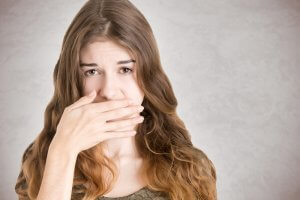
One way to check your breath yourself is to lick your wrist, wait for it to dry, and give it a sniff. If it smells bad where you licked it, chances are your breath smells the same.
This bad breath test isn’t foolproof, but it should give you a good indication of what others can smell.
You might notice people turning away when you talk to them, but it’s best not to over-analyse such behaviour.
While some people can be completely oblivious to the odours they’re projecting towards others, some people believe they have constant bad breath when in fact their breath is normal.
This is known as ‘halitophobia’ – fear of bad breath. People with halitophobia can become obsessed with their oral hygiene in an effort to improve their breath, and this may result in damage to teeth and gums through over-brushing.
If you want to know whether you have bad breath, it’s best to ask a close friend or family member who you trust to give you an honest answer. Alternatively, mention your concerns to your dentist or hygienist at your next visit. They won’t be embarrassed to tell you the truth and can offer advice if you do have halitosis.
What causes bad breath and halitosis?
Let’s take a look at some of the most common causes of bad breath, and the people who might be most susceptible.
Poor oral hygiene
One of the most common reasons for bad breath is a buildup of food particles and plaque in the mouth. Food not removed by brushing and flossing will start to rot, emitting the same kinds of smells you’d expect from a kitchen bin or compost heap.
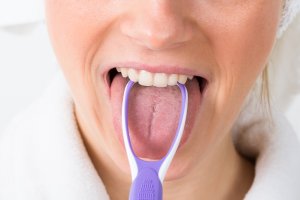
Meanwhile, a sticky film – dental plaque – is constantly building up on your teeth. The bacteria in plaque feed on carbohydrates left behind from your food and drink, producing acids in the process. As you can imagine, plaque doesn’t make your mouth smell great.
If you have crooked teeth or wear fixed braces, there are more places for food to become trapped and for bacteria to build up. Removable braces and dentures can also become smelly if they aren’t cleaned properly.
Saliva goes some way towards neutralising plaque acids and washing away bad smells, but regular brushing and flossing is the only way to combat this problem properly.
You can also use a tongue scraper to clean away any gunk left on your tongue.
Dental problems
Plaque (and the acid it produces) is responsible for tooth decay, cavities and gum disease. If one of your teeth is rotting, it stands to reason that it will produce a bad smell. Any other kind of infection in the mouth, for example from an impacted tooth, abscess or ulcer, might also lead to halitosis.
If you notice bad breath after a tooth extraction, it could be a sign of infection or dry socket. Contact your dentist straight away, especially if you are experiencing pain.
Food, drink and smoking
The things you consume affect how your breath smells. The following may all cause bad breath:
- Tobacco: Smoking causes smelly breath because the chemicals in tobacco leave a bad odour in the mouth and throat. Tobacco products can also contribute to gum disease and dry out the mouth, worsening halitosis and contributing to smoker’s teeth stains.
- Sugary and acidic foods: Although these foods aren’t particularly smelly themselves, they contribute to faster plaque buildup.
- Strong-smelling foods: These are the obvious ones: garlic, onion, spicy foods, and fish can all leave behind a smell that’s hard to disguise.
- Alcohol: Not only does alcohol dry the mouth out, many types of alcohol also contain sugars: the perfect recipe for bad morning breath, especially if you forget to brush your teeth after consuming it.
- Coffee: The acidity and strong aroma of coffee lead to its distinctive bad breath smell.
- Low-carb diets: “Keto” diets which involve high fat and protein intake result in the production of smelly chemicals called ketones. This is one of the most easily identifiable types of bad breath smells, something like a fruity nail polish remover. Ketones are also produced when a person with diabetes is low on insulin.
Dry mouth

Another cause of bad breath is a condition called xerostomia, more commonly known as ‘dry mouth’. This occurs when the salivary glands aren’t producing enough saliva to keep the mouth moist.
Without enough saliva in the mouth, food isn’t washed away as effectively and bacteria builds up more quickly, causing halitosis.
Factors that contribute to dry mouth include alcohol, tobacco, caffeine, certain medications, and some medical conditions.
This can also be a problem for people who breathe through their mouth instead of their nose.
Nose and throat infections
A sinus infection or sore throat and bad breath often go hand-in-hand. Excess mucus produced by your body to fight these infections causes post-nasal drip, and oral malodour arises from bacteria feeding on that mucus in your throat.
Other health conditions
Although the causes of bad breath are usually in the mouth, it’s possible to get bad breath from the stomach as a result of other health conditions, including:
- Acid reflux
- Diabetes
- Liver or kidney disease
- Other digestive/metabolic problems
- Certain kinds of cancer
How to cure bad breath coming from stomach
In some cases, bad breath can also be caused by problems in the digestive system, such as acid reflux or gastrointestinal issues. Here are some tips on how to eliminate bad breath from the stomach:
- Maintain good oral hygiene: Brush your teeth twice a day, floss, and use mouthwash to remove any food particles and bacteria that may contribute to bad breath.
- Stay hydrated: Drinking water helps to flush out any toxins and bacteria that may be causing bad breath.
- Avoid certain foods: Foods such as onions, garlic, and spicy foods can cause bad breath.
- Eat more fibre: Eating fibre-rich foods like fruits, vegetables, and whole grains can help improve digestion and prevent bad breath.
- Chew sugar-free gum: Chewing sugar-free gum stimulates saliva production, which can help to neutralise the acids and bacteria that cause bad breath.
- Treat underlying medical conditions: If you have an underlying medical condition such as acid reflux or gastrointestinal issues, treating these conditions can help to eliminate bad breath.
In the short video clip below, a doctor explains exactly how acid reflux can cause halitosis. Your GP can advise you if you’re concerned about this or any of the other problems mentioned above.
Bad morning breath
If you often get bad breath in the morning, it could be a sign you didn’t do a good enough job of removing plaque from your teeth the night before. The fact that your mouth naturally dries out overnight doesn’t help.
Using an antibacterial mouthwash right before bedtime can help keep bacteria at bay until the morning and alleviate bad morning breath. Just don’t use mouthwash immediately after brushing, as it washes off the beneficial ingredients in your toothpaste.

If you have constant bad breath in the morning, consider using a plaque revealer after brushing in the evening. This will show you exactly how much plaque is left on your teeth after you think they are clean.
Also, take note of what you eat in the evening, and avoid foods and drinks that make your morning breath worse.
Bad breath in children
Babies, toddlers and older kids can get bad breath just like adults if they don’t keep their teeth clean. Take them for regular dental visits to check for cavities.
If your baby has bad breath while teething, it’s possible that some food has got stuck under one of the small flaps of gum. Use a baby toothbrush to try and prevent this, but speak to a dentist if you notice inflammation that’s worsening.
Bad breath in children, especially younger children and toddlers, might also be caused by something they’ve stuck up their nose.
Bad breath in pregnancy
It’s quite common for women to experience bad breath in pregnancy, especially if they are vomiting due to morning sickness. As well as this, hormonal changes in the mouth contribute to dehydration and halitosis.
How to get rid of bad breath fast
So you’ve got a job interview or a first date coming up and you realise your breath isn’t as fresh as you’d like, what do you do? Here are some ways to fix bad breath quickly – but keep in mind that these only mask the problem temporarily.
The best mouthwash for bad breath
A quick swish with mouthwash helps stop bad breath in a couple of ways. Firstly, it can dislodge food particles and bacteria that would otherwise be making your mouth smell. Secondly, it freshens your breath – usually with mint or other herbs.
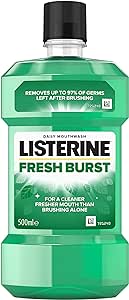
It’s best to choose an antibacterial bad breath mouthwash, because this will help fight bacteria and reduce plaque at the same time. The biggest brand on the market is Listerine, with mouthwashes for bad breath in many different flavours and formulas.
However, if you’re not a fan of the strong minty taste of traditional mouthwash, you may prefer the mild mint flavour of The Breath Co Fresh Breath Oral Rinse. This mouthwash for halitosis is made in the US, and although it’s not as cheap as other brands, users say it’s worth paying the extra for a product that really does work.
“Worth the money because it actually works! Really keeps your breath fresh!” says one reviewer.
If you prefer to use a more natural mouthwash, there are plenty of non-fluoride, alcohol-free, vegan, SLS free products on the market. Make sure to choose one with antibacterial properties, that has ingredients included that will treat bad breath.
Check out our best mouthwash page for more recommendations and advice on how to use it correctly.
Fresh breath toothpaste
Brushing your teeth regularly is an important part of preventing halitosis, but the toothpaste you use can make a difference too. Most commercial brands have a variant specifically for fresher breath, like Sensodyne Repair and Protect Extra Fresh Toothpaste.
A natural herbal toothpaste might also be effective at stopping bad breath – our guide to natural and homemade toothpaste has some recommendations and recipes. Ultimately, the best toothpaste for your bad breath may come down to personal preference as much as the toothpaste itself.
Chewing gum/mints
If you’re out and about, the most convenient way to get rid of bad breath is usually with chewing gum or mints. They’re widely available, you don’t have to find a bathroom, and within a couple of minutes, your mouth should be much fresher.
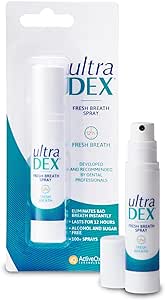
Choose a brand and flavour according to your own preference, but make sure it’s sugar-free. Otherwise, the fresh minty taste will soon give way to even more fuzzy plaque on your teeth. Chewing gum containing xylitol can also help fight decay.
Bad breath spray
Another easy way to fix bad breath on the go is with a breath spray. This provides an instant fix of freshness; especially handy when chewing gum isn’t appropriate.
Look for a spray that actively works to destroy the causes of bad breath rather than just masking the smell. UltraDEX Fresh Breath Spray is a popular choice – it’s alcohol-free and clinically proven to freshen breath for 12 hours.
Home remedies for bad breath
You don’t even have to go to the shops to find effective bad breath treatments. Staying hydrated with water is arguably one of the best things for bad breath, but there are other home remedies worth noting. Try one of these natural remedies for bad breath at home and see if it makes a difference:
Home remedy | How it works |
Parsley | Chew on it after eating to release chlorophyll which neutralises odours. |
Green tea and mint tea | Temporarily disinfects the mouth and freshens breath. |
Fennel | Antibacterial and increases saliva production. Chew it or make a tea. |
Probiotic yoghurt | Fights bacteria in the mouth. Eat around 200g a day for best effects. |
Baking soda mouthwash | Antibacterial. Dissolve 2 teaspoons of baking soda in a glass of warm water, swish around for 30 seconds, and spit. |
How to cure bad breath permanently
Sometimes, all it takes to stop bad breath is a few lifestyle changes.
An improved oral hygiene routine might be enough to cure halitosis. This means brushing twice daily (one of those times being before bed) and flossing or using interdental brushes once a day. A tongue scraper can help keep the tongue free from excess bacteria, too.
Read more about the correct routine and technique in our guide to brushing teeth properly.
Be sure to visit your dentist for regular checkups as well. They may recommend a scale and polish to remove plaque and tartar, leaving teeth completely clean. If you have signs of gum disease, any gingivitis treatment will probably help your breath as well.
You can also avoid the foods and drinks mentioned above which are common causes of bad breath.
If you know that you suffer from dry mouth, make an effort to stay hydrated during the day. You can also take an over-the-counter moisturising product to stop your mouth getting too dry.
If it gets worse at nighttime, you could be breathing through your mouth while you sleep. Mouth tape or a chin strap are possible solutions to this.
Finally, if you smoke, the best thing for bad breath is to quit. Even if you use e-cigarettes which don’t have a bad smell, the nicotine in them inhibits saliva production, thereby contributing indirectly to halitosis.
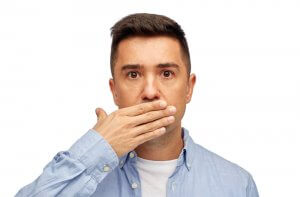
Halitosis treatment
If you have tried all of the above bad breath cures and don’t notice a difference, you may need to seek medical treatment for chronic bad breath.
The first stop should be your dentist. Fixing any underlying oral health problems like gum disease, cavities, and ill-fitting dentures might just cure your bad breath. Treatment may include teeth cleaning, fillings, extractions and new dentures – all of which are available on the NHS.
If your dentist can’t identify any causes of bad breath in your mouth to get rid of your halitosis, they might refer you to a GP for further medical checks. Then, the matter of how to treat your bad breath will depend on the cause that is ultimately identified.
Conclusion
If you’re wondering how to cure bad breath, the answer more than likely lies in your oral hygiene. While there are various quick fixes like mouthwash and breath spray that will get rid of bad breath temporarily, better dental health is the best way to stop it for good.
You might also need a dental checkup to treat halitosis causes like tartar buildup, tooth decay and gum disease. In rarer cases, the cure for bad breath might involve treating another health problem like diabetes or acid reflux.
FAQs
Why do I have bad breath?
It might be because of something you ate because you’re not brushing your teeth well enough, or because of some underlying cause that requires further treatment.
What causes bad breath even after brushing?
If you follow a good oral hygiene routine, flossing and brushing daily, there could be another oral health problem or medical condition that’s causing halitosis.
Can wisdom teeth cause bad breath?
Only if they are decaying or have developed an infection from impaction. Crooked wisdom teeth are more likely to trap food, which will start to smell if it’s not cleaned away.
Is a white tongue linked to smelly breath?
Bacteria can build up on the tongue and cause the papillae on the tongue’s surface to swell. The result is a white tongue, often accompanied by an unpleasant odour.
American Dental Association: Halitosis. Consulted 10th May 2023.
NCBI: Halitosis: From diagnosis to management. Consulted 10th May 2023.
Mayo Clinic: White tongue. Consulted 10th May 2023.
JOCPD: Effect of Probiotic Yogurt and Xylitol-Containing Chewing Gums on Salivary S Mutans Count. Consulted 10th May 2023.





